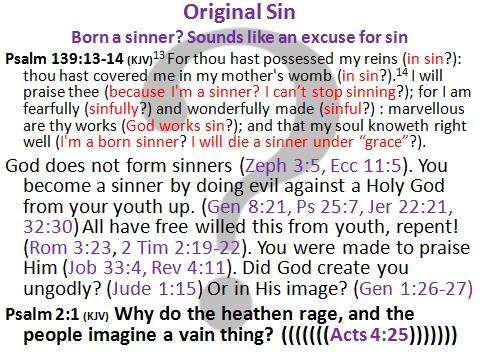
Are we Born Sinners? Do We “Inherit” Adam’s Sin? Psalm 51:5 Rightly Divided!
Psalm 51:5- “Behold, I was shapen in iniquity, and in sin did my mother conceive me.” KJV
This is a Hebrew poetic parallelism, with the second line of the verse saying the same thing as the first line in a slightly different way.
The subject of this verse is NOT the state or constitution of David’s nature as a sinner at, or before, his birth. The subject is, as the verse clearly states, the `circumstances’ of his conception- the sexual union which produced him was an act of sin, and addresses the unrighteousness of his mother’s act, not anything (such as a sin nature) inherent within himself.
The NIV’s version of this verse is an bastardized INTERPRETATION, not a translation: “Surely I was sinful at birth, sinful from the time my mother conceived me.”
David had two half-sisters (Zeruiah, Abigail)…..:
1CHR 2:13-16 13 “And Jesse begat his firstborn Eliab, and Abinadab the second, and Shimma the third, 14 Nethaneel the fourth, Raddai the fifth, 15 Ozem the sixth, David the seventh: 16 Whose sisters were Zeruiah, and Abigail. And the sons of Zeruiah; Abishai, and Joab, and Asahel, three. 17 And Abigail bare Amasa: and the father of Amasa was Jether the Ishmeelite.”
….and the father of David’s half-sisters was not Jesse, but Nahash: 2Sam 17:25 “And Absalom made Amasa captain of the host instead of Joab: which Amasa was a man’s son, whose name was Ithra an Israelite, that went in to Abigail the daughter of Nahash, sister to Zeruiah Joab’s mother.”
Nahash, the father of Zeruiah and Abigal, David’s half-sisters, was an Ammonite king.
1Sam 11:1 “Then Nahash the Ammonite came up, and encamped against Jabeshgilead: and all the men of Jabesh said unto Nahash, Make a covenant with us, and we will serve thee.”
1Sam 12:12 “And when ye saw that Nahash the king of the children of Ammon came against you, ye said unto me, Nay; but a king shall reign over us: when the LORD your God was your king.”
David’s father was Jesse, not Nahash. Zeruiah and Abigal were David’s half-sisters through his mother’s previous marriage to Nahash. This would also help explain why Nahash showed kindness to David, perhaps out of respect for David’s mother, Nahash’s former wife and the mother of two of Nahash’s children.
2Sam 10:2 “Then said David, I will shew kindness unto Hanun the son of Nahash, as his father shewed kindness unto me. And David sent to comfort him by the hand of his servants for his father. And David’s servants came into the land of the children of Ammon.”
David’s mother was most likely the second wife of Jesse, the first wife being the mother of David’s half-brothers. Jesse’s first wife’s standing before the `righteousness of the law’, (her not having been married to, or the concubine of, a heathen king, as was David’s mother), would have been superior to that of David’s mother, and explains why David’s half-brothers, Jesse’s other sons, would have felt they were superior to David, and why he would be accused of being prideful, for thinking he was as good as them….
1Sam 17:28-30 28 “And Eliab his eldest brother heard when he spake unto the men; and Eliab’s anger was kindled against David, and he said, Why camest thou down hither? and with whom hast thou left those few sheep in the wilderness? I know thy pride, and the naughtiness of thine heart; for thou art come down that thou mightest see the battle. 29 And David said, What have I now done? Is there not a cause? 30 And he turned from him toward another, and spake after the same manner: and the people answered him again after the former manner.”
…and why David was not considered, by his father Jesse, as `true’ a son as his half-brothers. Samuel had called Jesse and his sons, and thus expected `all’ his sons, to the sacrifice (1 Sam 16:5, 11). Jesse, having been told to bring `his sons’ by a prophet of the Lord everyone feared (1 Sam 16:4), was confident he had obeyed the prophet, even knowing he did not bring David….
1Sam 16:11 “And Samuel said unto Jesse, Are here all thy children? And he said, There remaineth yet the youngest, and, behold, he keepeth the sheep. And Samuel said unto Jesse, Send and fetch him: for we will not sit down till he come hither.”
….which would be consistent with God’s sometimes choosing that which men esteemed as worthless (the `least’) to be the greatest: (Gideon- Jud 6:15; King Saul- 1 Sam 9:21; Jesus – Mt 2:6, Lk 9:48)
David’s mother was apparently a Jewish woman, because `no Ammonite shall enter the congregation of the Lord to the 10th generation’ (Deu 23:3), and yet in Ps 86:16 and Ps 116:16, David refers to himself as “the son of thy handmaid”, which would seem to testify to his mother’s relationship with the Lord. David’s mother was, in the eyes of Jewish law, considered `defiled’ by her previous relationship to an Ammonite.
Nu 25:1,2; De 7:3,4; 1Ki 11:2-4, Ezr 9:2; Ne 13:23,25; 2Co 6:14-17



